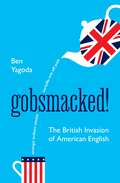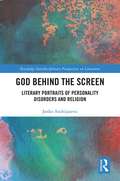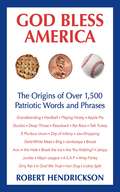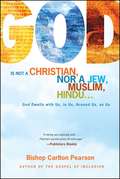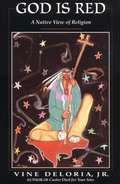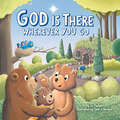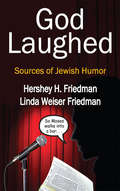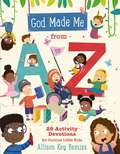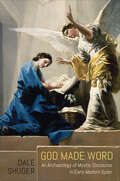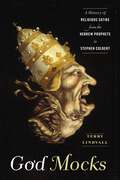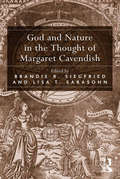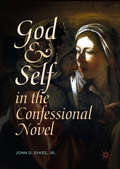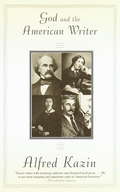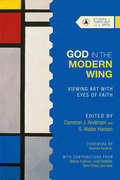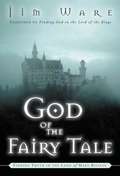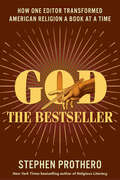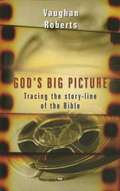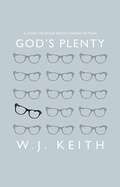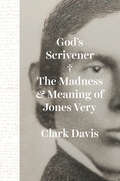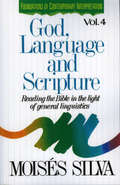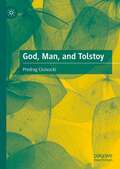- Table View
- List View
Gobsmacked!: The British Invasion of American English
by Ben YagodaA spot-on guide to how and why Americans have become so bloody keen on Britishisms—for good or illThe British love to complain that words and phrases imported from America—from French fries to Awesome, man!—are destroying the English language. But what about the influence going the other way? Britishisms have been making their way into the American lexicon for more than 150 years, but the process has accelerated since the turn of the twenty-first century. From acclaimed writer and language commentator Ben Yagoda, Gobsmacked! is a witty, entertaining, and enlightening account of how and why scores of British words and phrases—such as one-off, go missing, curate, early days, kerfuffle, easy peasy, and cheeky—have been enthusiastically taken up by Yanks.After tracing Britishisms that entered the American vocabulary in the nineteenth century and during the world wars, Gobsmacked! discusses the most-used British terms in America today. It features chapters on the American embrace of British insults and curses, sports terms, and words about food and drinks. The book also explores the American adoption of British spellings, pronunciations, and grammar, and cases where Americans have misconstrued British expressions (for example, changing can&’t be arsed to can&’t be asked) or adopted faux-British usages, like pronouncing divisive as &“divissive.&” Finally, the book offers some guidance on just how many Britishisms an American can safely adopt without coming off like an arse.Rigorously researched and documented but written in a light, conversational style, this is a book that general readers and language obsessives will love. Its revealing account of a surprising and underrecognized language revolution might even leave them, well, gobsmacked.
God Behind the Screen: Literary Portraits of Personality Disorders and Religion (Routledge Interdisciplinary Perspectives on Literature)
by Janko AndrijasevicThis interdisciplinary study of literary characters sheds light on the relatively under-studied phenomenon of religious psychopathy. God Behind the Screen: Literary Portrais of Religious Psychopathy identifies and rigorously examines protagonists in works from a variety of genres, written by authors such as Aldous Huxley, Jane Austin, Sinclair Lewis, and Steven King, who are both fervently religous and suffer from a range of disorders underneath the umbrella of psychopathy.
God Bless America: The Origins of Over 1,500 Patriotic Words and Phrases
by Robert HendricksonThe Queen's English has no place across the pond, where a long history of defiance, creativity, and originality has made its way into the everyday vocabulary of Americans coast-to-coast. God Bless America is an informative and entertaining guide to the meaning and history beneath our uniquely American words and phrases. Robert Hendrickson makes it clear that whether you're ordering "fried chicken" or heading out to see a "movie," you are celebrating contributions to the English language made by Americans, both famous and forgotten. With extensive research and a passion for language, Hendrickson furthers our understanding of the familiar and introduces us to the more obscure artifacts of American speech.God Bless America provides the definitions and background for many uniquely American phrases and terms, such as: Bald eagle Boston baked beans Five-and-ten Give 'em hell Lazy Susan Sho' nuff Yankee Doodle And more!A dictionary packed full of historical accounts, etymological peculiarities, and imaginative spirit, God Bless America represents not only the American language but also the American people. This book provides an undeniable resource for travelers, patriots, and Anglophiles from all walks of life.
God Is Not a Christian, Nor a Jew, Muslim, Hindu...
by Carlton PearsonThe author of The Gospel of Inclusion continues to rouse organized religion as he raises controversial issues and provides enlightening answers to the deepest questions about God and faith. What is God? Where is God? Who is the one true God? Questions such as these have driven a thousand human struggles, through war, terrorism, and oppression. Humanity has responded by branching off into multiple religions, including Christianity, Judaism, Islam--each one pitted against the other. But it doesn't have to be that way.In God Is Not a Christian, nor a Jew, Muslim, Hindu . . . , the provocative and acclaimed Bishop Carlton Pearson follows up on his celebrated first book, The Gospel of Inclusion, to tackle these questions and many more, exploring new ideas about God and faith and putting forth the stunning assertion that God belongs to no particular religion but is an ever-loving presence available to all. For these beliefs, Bishop Pearson lost his thriving Pentecostal ministry but was catapulted instead into a greater pulpit. His readership has grown through appearances on national television and an extensive speaking schedule. With the world in the midst of a holy war, there is no better time for the wisdom of Bishop Pearson to reach a global audience.Bishop Pearson's many loyal fans, along with new readers, will surely welcome this provocative and eye-opening exploration of a deeper faith, one that goes far beyond any fundamentalist way of thinking, be it Christian, Jewish, Muslim, Hindu, etc. Simply put, Bishop Pearson dares to tell the truth so many others are too afraid to face.
God Is Red: A Native View of Religion (updated edition)
by Vine Deloria Jr.Deloria, a Native American educator, lawyer, and philosopher, has updated his classic work on native religion. In God is Red Deloria argues that Christianity has failed today's society, and describes basic tenets that underlie Native religions.
God Is There Wherever You Go
by Jo ParkerPerfect for bedtime, nap time, or anytime in between, God Is There Wherever You Go provides a valuable opportunity to teach children that through faith they are always guided and protected by the Lord.Whimsical illustrations and inspirational verses from the Bible remind young readers that God is there wherever they go. And with a beautiful bookplate for personalization, this the perfect book for someone special.
God Laughed: Sources of Jewish Humor (Jewish Studies)
by Hershey H. FriedmanHumor has had a profound effect on the way the Jewish people see the world, and has sustained them through millennia of hardships and suffering. God Laughed reviews, organizes, and categorizes the humor of the ancient Jewish texts-the Hebrew Bible, the Talmud, and Midrash-in a clear, readable, and accessible manner. These works have influenced the Jewish people in many ways, and all are replete with humor and wit. Inevitably, this oeuvre of Jewish humor has itself influenced generations of comics, as well as genres of humor. The authors use examples of Biblical humor from several broad categories, including irony, sarcasm, wordplay, humorous names, humorous imagery, and humorous situations. Because their primary purpose is not to entertain, but to teach humanity how to live the ideal life, much of the humor in the Talmud and the Midrash has a single purpose: to demonstrate that evil is wrong and even, at times, ludicrous. This may help explain why approximately 1,500 years after its closing, the Talmud is still such a fascinating work.
God Made Me from A to Z: 26 Activity Devotions for Curious Little Kids
by Allison Key BemissTeach preschoolers their ABCs and faith using the hands-on, sensory experiences and projects in this creative activity devotional that explores living for Jesus with curiosity and excitement.Written by a mom, teacher, and expert in STEAM activities and early childhood education, this activity devotional is packed with opportunities for little ones to grow, learn, and have fun in God's great, exciting world. This book includes ...26 devotions for each letter that focus on curiosity and inquiry and include biblically-rooted "I Am" affirmations;short, easy-to-understand Bible verses and prayers that speak to a young child's sweet and joyful heart;active projects, crafts, recipes, games, and songs for hands-on sensory learning;an introduction for families overviewing the research-based design and strategies embedded in the projects; andaccess to a downloadable alphabet coloring book.God Made Me from A to Z is designed fortoddlers and preschoolers ages 2 to 5high-energy children, neurodivergent children, and children with special needsSunday school classes, preschool lessons, and homeschool familiesa New Year's or summer family project, starting a new school year, and gifts for birthdays, Easter baskets, and ChristmasYoung children are natural explorers. Help them discover God's world and how wonderfully God created them while encouraging their hearts with scriptural truths and gifting them special family memories.
God Made Word: An Archaeology of Mystic Discourse in Early Modern Spain (Toronto Iberic)
by Dale ShugerThe Golden Age of Spanish mysticism has traditionally been read in terms of individual authors or theological traditions. God Made Word, however, considers early modern Spanish mysticism as a question of language and as a discourse that circulated in concrete social, institutional, and geographic spaces. Proposing a new reading of early modern Spanish mysticism, God Made Word traces the struggles over the representation of interiorized spiritual union – the tension between making it known and conveying its unknowability – far beyond the usual canon of mystic literature. Dale Shuger combines a study of genres that have traditionally been the object of literary study, including poetry, theatre, and autobiography, with a language-based analysis of other areas that have largely been studied by historians and theologians. Arguing that these generic separations grew out of an increasing preoccupation with the cultivation and control of interiorized spirituality, God Made Word shows that by tracing certain mystic representations we come to understand the emergence of different discursive rules and expectations for a wide range of representations of the ineffable.
God Mocks: A History of Religious Satire from the Hebrew Prophets to Stephen Colbert
by Terry LindvallWinner of the 2016 Religious Communication Association Book of the Year AwardIn God Mocks, Terry Lindvall ventures into the muddy and dangerous realm of religious satire, chronicling its evolution from the biblical wit and humor of the Hebrew prophets through the Roman Era and the Middle Ages all the way up to the present. He takes the reader on a journey through the work of Chaucer and his Canterbury Tales, Cervantes, Jonathan Swift, and Mark Twain, and ending with the mediated entertainment of modern wags like Stephen Colbert. Lindvall finds that there is a method to the madness of these mockers: true satire, he argues, is at its heart moral outrage expressed in laughter. But there are remarkable differences in how these religious satirists express their outrage.The changing costumes of religious satirists fit their times. The earthy coarse language of Martin Luther and Sir Thomas More during the carnival spirit of the late medieval period was refined with the enlightened wit of Alexander Pope. The sacrilege of Monty Python does not translate well to the ironic voices of Soren Kierkegaard. The religious satirist does not even need to be part of the community of faith. All he needs is an eye and ear for the folly and chicanery of religious poseurs. To follow the paths of the satirist, writes Lindvall, is to encounter the odd and peculiar treasures who are God’s mouthpieces. In God Mocks, he offers an engaging look at their religious use of humor toward moral ends.
God and Nature in the Thought of Margaret Cavendish
by Lisa T. Sarasohn Brandie R. SiegfriedOnly recently have scholars begun to note Margaret Cavendish’s references to 'God,' 'spirits,' and the 'rational soul,' and little has been published in this regard. This volume addresses that scarcity by taking up the theological threads woven into Cavendish’s ideas about nature, matter, magic, governance, and social relations, with special attention given to Cavendish’s literary and philosophical works. Reflecting the lively state of Cavendish studies, God and Nature in the Thought of Margaret Cavendish allows for disagreements among the contributing authors, whose readings of Cavendish sometimes vary in significant ways; and it encourages further exploration of the theological elements evident in her literary and philosophical works. Despite the diversity of thought developed here, several significant points of convergence establish a foundation for future work on Cavendish’s vision of nature, philosophy, and God. The chapters collected here enhance our understanding of the intriguing-and sometimes brilliant-contributions Cavendish made to debates about God’s place in the scientific cosmos.
God and Self in the Confessional Novel
by John D. Sykes Jr.God and Self in the Confessional Novel explores the question: what happened to the theological practice of confession when it entered the modern novel? Beginning with the premise that guilt remains a universal human concern, this book considers confession via the classic confessional texts of Augustine and Rousseau. Employing this framework, John D. Sykes, Jr. examines Goethe’s The Sorrows of Young Werther, Dostoevsky’s Notes from Underground, Percy’s Lancelot, and McEwan’s Atonement to investigate the evolution of confession and guilt in literature from the eighteenth century to the early twenty-first century.
God and the American Writer
by Alfred Kazin"God and the American Writer does more to illuminate the fundamental purposes and motivations of our greatest writers from Hawthorne to Faulkner than any study I have read in the past fifty-five years--that is, since the same author's On Native Grounds. --Louis S. Auchincloss This is the culminating work of the finest living critic of American literature. Alfred Kazin brings a lifetime of thought and reading to the triumphant elucidation of his fascinating and slippery subjects: what the meaning of God has been for American writers, and how those writers, from the New England Calvinists to William Faulkner, have expressed it. In a series of trenchant critical studies of writers as divergent as Hawthorne, Melville, Emerson, Lincoln, Whitman, Dickinson, Twain, William James, Eliot, Frost, and Faulkner, Kazin gives a profound sense of each, and his quotations from their works are artfully chosen to pursue the main theme. The centerpiece of the book is the reflection in American writing of the great American tragedy, the Civil War--so deeply involved in the whole complex issue of religion in America. An enthralling book by a major writer. "This is a book about the place of God in the imaginative life of a country that for two centuries countenanced slavery and then engaged in a fratricidal war to end it. For Americans no subject is more compelling or, in its entanglement with the deepest roots of the national soul, more terrible. And no one has ever written as incisively, as movingly, or as unforgivingly about it as Alfred Kazin has here. " --Louis Menand "In the era of willful obfuscation, Alfred Kazin is the good, clear word, a brilliant scholar and an original reader. His latest book, God and the American Writer, which comes fifty-five years after On Native Grounds, proves he has lost nothing and gives us everything he has." --David Remnick "American writers have been born into all sorts of religious sects, but have had to struggle in solitude to make sense of God. Alfred Kazin, a cosmos unto himself, has written brilliantly and affectingly of how a dozen or so of our finest authors--poets, novelists, philosophers, and one president--endured and illuminated that struggle. Kazin is sometimes passionate, even fierce, especially in his discussions of slavery and of his hero (and mine), Abraham Lincoln. But, as ever, Kazin's writing is tempered by an enormous American empathy and by his sense of irony about our country and its spiritual predicaments. Spare, sharp, and immensely learned, God and the American Writer is the most moving volume of criticism yet by our greatest living critic. " --Sean Wilentz
God in the Modern Wing: Viewing Art with Eyes of Faith (Studies in Theology and the Arts Series)
by G. Walter Hansen Cameron J. Anderson Cameron J. Anderson, G. Walter HansenShould Christians even bother with the modern wing at the art museum? After all, modern art and artists are often caricatured as rabidly opposed to God, the church—indeed, to faith of any kind. But is that all there is to the story? In this Studies in Theology and the Arts volume, coeditors Cameron J. Anderson and G. Walter Hansen gather the reflections of artists, art historians, and theologians who collectively offer a more complicated narrative of the history of modern art and its place in the Christian life. Here, readers will find insights on the work and faith of artists including Marc Chagall, Jackson Pollock, Mark Rothko, Andy Warhol, and more. For those willing to look with eyes of faith, they may just find that God is present in the modern wing too.
God of Many Names: Play, Poetry and Power in Hellenic Thought, From Homer to Aristotle
by Mihai I. SpariosuTracing the interrelationship among play, poetic imitation, and power to the Hellenic world, Mihai I. Spariosu provides a revisionist model of cultural change in Greek antiquity. Challenging the traditional and static distinction made between archaic and later Greek culture, Spariosu's perspective is grounded in a dialectical understanding of values whose dominance depends on cultural emphasis and which shifts through time.Building upon the scholarship of an earlier volume, Dionysus Reborn, Spariosu her continues to draw on Dionysus--the "God of many names," of both poetic play and sacred power--as a mythical embodiment of the two sides of the classical Greek mentality. Combining philosophical reflection with close textual analysis, the author examines the divided nature of the Hellenic mentality in such primary canonic texts as the Iliad, the Odyssey, the Theogony, Works and Days, the most well-known of the Presocratic fragments, Euripides' Bacchae, Aristophanes' The Frogs, Plato's Republic and Laws, and Aristotle's Poetics and Politics.Spariosu's model illuminates the many of the most enduring questions in contemporary humanistic study and addresses modern questions about the nature of the interrelation of poetry, ethics, and politics.
God of the Fairy Tale: Finding Truth in the Land of Make-Believe
by Jim WareWhat Treasures Are Hidden in the Enchanted Woods? More than just bedtime traditions, more than simple children's literature, the most enduring stories are echoes of the greatest of all stories, the Gospel. God of the Fairy Tale is a collection of spiritual reflections on the truths found in classic fairy tales, truths that point us to the ultimate Truth about God, redemption, and ourselves. Delving into twenty classic folk and fairy tales, God of the Fairy Tale leads us into the mystical landscape of elves, goblins, and talking animals to reveal the jewels of truth that hide inside these most simple of stories. Through the fables of Snow White, Cinderella, Hansel and Gretel, and many others, we discover a perspective not unlike that of the Bible-a world of people trying to be something more, questing to do good in a realm fraught with evil, where a turn of the tables leaves the strong defeated and the weak victorious. Each tale is presented along with a meditation on the spiritual and theological themes present. God of the Fairy Tale will warm your heart with a world of characters, creatures, and circumstances that spin an entertaining yarn and affirm the most essential Christian worldviews.
God the Bestseller: How One Editor Transformed American Religion a Book at a Time
by Stephen ProtheroNew York Times bestselling author and acclaimed religion scholar, Stephen Prothero, captures the compelling and unique saga of twentieth-century America on an identity quest through the eyes and books of one of the most influential editors of the day—a search, born of two world wars, for resolution of our divided identity as a Christian nation and a nation of religions.One summer evening in 1916 in Blanchester, Ohio, a sixteen-year-old farm boy was riding his horse past the town cemetery. The horse reared back and whinnied, and Eugene Exman saw God. For the rest of his life, he struggled to recreate that moment. Through a treasure of personal letters and papers, God, the Bestseller explores Exman’s personal quest. A journey that would lead him in the late 1920s to the Harper religious books department, which he turned during the Great Depression into a money-making juggernaut and the country’s top religion publisher. Exman’s role in the shaping of American religion is undeniable. Here was a man who was ahead of his time and leading the rest of the nation through books on a spiritual exploration. Exman published bestsellers by the controversial preacher Harry Emerson Fosdick, the Catholic radical Dorothy Day, the Civil Rights pioneer Howard Thurman, and two Nobel laureates: Albert Schweitzer and Martin Luther King Jr. Exman did not just sit at a desk and read. In addition to his lifelong relationships with the most influential leaders of the day, Exman was on a spiritual journey of his own traversing the world in search of God. He founded a club of mystics, dropped acid in 1958, four years before Timothy Leary. And six years before The Beatles went to India, he found a guru there in 1962. In the end, this is the story of the popularization of the religion of experience—a cultural story of modern America on a quest of its own. Exman helped to reimagine and remake American religion, turning the United States into a place where denominational boundaries are blurred, diversity is valued, and the only creed is that individual spiritual experience is the essence of religion.
God's Big Picture: Tracing the Storyline of the Bible
by Vaughan RobertsSixty-six books written by forty people over nearly 2,000 years, in two languages and several different genres. A worldwide bestseller published in countless sizes and bindings, translations and languages. Sworn by in court, fought over by religious people, quoted in arguments. The Bible is clearly no ordinary book. How can you begin to read and understand it as a whole?In this excellent overview, Vaughan Roberts gives you the big picture--showing how the different parts of the Bible fit together under the theme of the kingdom of God. He provides both the encouragement and the tools to help you read the Bible with confidence and understanding. And he points you to the Bible's supreme subject, Jesus Christ, and the salvation God offers through him.
God's Gift of Language A
by Phyllis RandGod's Gift of Language A Writing & Grammar Work-text Phyllis Rand Ed. D.
God's Plenty: A Study of Hugh Hood's Short Fiction
by W. J. KeithA companion volume to Canadian Odyssey: A Reading of Hugh Hood's The New Age, God's Plenty surveys the short fiction of the writer dubbed Canada's Proust. Hugh Hood, an unparalleled stylist, was equally accomplished in short forms and long: this straight-talking assessment of Hood's stories is thorough, insightful, readable, and profound. With its story-by-story breakdown and rigorous engagement with Hood's technique, God's Plenty offers an excellent introduction not just to an undersung master, but to the art of short fiction full stop.W.J. Keith is a professor emeritus at the University of Toronto.
God's Scrivener: The Madness & Meaning of Jones Very
by Clark DavisA biography of a long-forgotten but vital American Transcendentalist poet. In September of 1838, a few months after Ralph Waldo Emerson delivered his controversial Divinity School address, a twenty-five-year-old tutor and divinity student at Harvard named Jones Very stood before his beginning Greek class and proclaimed himself “the second coming.” Over the next twenty months, despite a brief confinement in a mental hospital, he would write more than three hundred sonnets, many of them in the voice of a prophet such as John the Baptist or even of Christ himself—all, he was quick to claim, dictated to him by the Holy Spirit. Befriended by the major figures of the Transcendentalist movement, Very strove to convert, among others, Elizabeth and Sophia Peabody, Bronson Alcott, Nathaniel Hawthorne, and most significantly, Emerson himself. Though shocking to some, his message was simple: by renouncing the individual will, anyone can become a “son of God” and thereby usher in a millennialist heaven on earth. Clark Davis’s masterful biography shows how Very came to embody both the full radicalism of Emersonian ideals and the trap of isolation and emptiness that lay in wait for those who sought complete transcendence. God’s Scrivener tells the story of Very’s life, work, and influence in depth, recovering the startling story of a forgotten American prophet, a “brave saint” whose life and work are central to the development of poetry and spirituality in America.
God's Scrivener: The Madness and Meaning of Jones Very
by Clark DavisA biography of a long-forgotten but vital American Transcendentalist poet. In September of 1838, a few months after Ralph Waldo Emerson delivered his controversial Divinity School address, a twenty-five-year-old tutor and divinity student at Harvard named Jones Very stood before his beginning Greek class and proclaimed himself “the second coming.” Over the next twenty months, despite a brief confinement in a mental hospital, he would write more than three hundred sonnets, many of them in the voice of a prophet such as John the Baptist or even of Christ himself—all, he was quick to claim, dictated to him by the Holy Spirit. Befriended by the major figures of the Transcendentalist movement, Very strove to convert, among others, Elizabeth and Sophia Peabody, Bronson Alcott, Nathaniel Hawthorne, and most significantly, Emerson himself. Though shocking to some, his message was simple: by renouncing the individual will, anyone can become a “son of God” and thereby usher in a millennialist heaven on earth. Clark Davis’s masterful biography shows how Very came to embody both the full radicalism of Emersonian ideals and the trap of isolation and emptiness that lay in wait for those who sought complete transcendence. God’s Scrivener tells the story of Very’s life, work, and influence in depth, recovering the startling story of a forgotten American prophet, a “brave saint” whose life and work are central to the development of poetry and spirituality in America.
God, Language and Scripture
by Moises SilvaThe primary aim of God, Language and Scripture is to provide guidance in the use of biblical languages. Secondarily this volume initiates the reader to the wonders and workings of language and points out how language is often misused, especially in regard to the Bible. This volume, however, in no way anticipates all the ways of mishandling language. Silva's emphasis is on 'global' rather than detailed concerns (though selected specific examples are used) of how language is misused. The book includes an account of the birth and growth of modern linguistics, an appreciation of its interdisciplinary character, particularly its ties with literary criticism, sociology, anthropology, psychology, and science. It surveys all levels of language description, but emphasizes the semantic and stylistic aspects of grammar and syntax, vocabulary, and discourse. In addition, it considers the transmission of the Bible (textual criticism and translation) as a mode of linguistic communication and interpretive process.
God, Man, and Tolstoy
by Predrag CicovackiThis book examines Leo Tolstoy’s struggle to understand the relationship of God and man, in connection with his attempt to answer questions regarding the meaning of life. Tolstoy addressed such issues in a systematic way and with great concerns for the future of humanity. Predrag Cicovacki approaches Tolstoy both as a thinker and as an artist, and examines various sides of his intellectual and artistic engagement: his social criticism, his ambiguous relationship to nature, his understanding of art, and his attempted reconstruction of the true religion. By combining philosophical, religious, and literary analysis, Cicovacki undertakes an interdisciplinary study, showing much can be learned from Tolstoy's insights, as well as from his mistakes.
